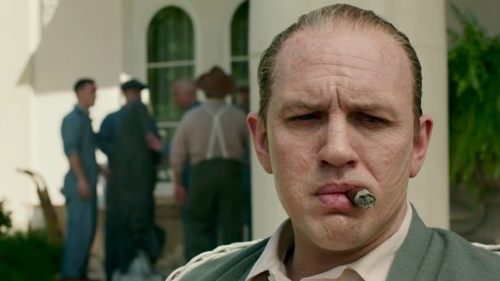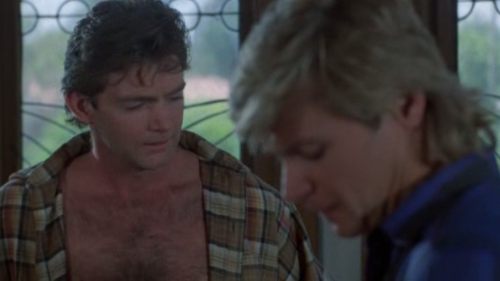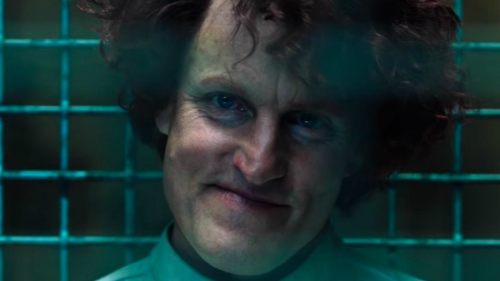Queer Underworld: VENOM (2018)
It’s a common adage that, in fiction, the monster is never just a monster. Horror, science fiction, and fantasy are the venues through which we explore ideas through metaphor and allegory, sometimes unintentionally through the lens of an audience who connects with a work’s themes in a manner specific to them. Such is the case with all manner of LGBTQ cinema, which has often relied on metaphor to smuggle queer themes into cinemas or been subject to queer interpretations after the fact. We at Birth.Movies.Death want to give those queer readings of genre films a voice. This is Queer Underworld.
When I decided that I wanted to use this month’s Queer Underworld to talk about polyamory – a topic I recognize isn’t strictly LGBTQ-related but still encompasses a sexual and romantic minority – I ran into a stumbling block as to how I would connect the topic to genre cinema. I initially wanted to talk about The Brides of Dracula and recontextualize them as a non-monogamous family unit, albeit one that is patriarchal and not necessarily romantic as to the women, but as I started to look for a suitable cinematic candidate for that thesis… well, the Brides can be interpreted that way based on their very existence as multiple romantic partners to one man, but there isn’t a whole lot of evidence on film to support analysis of that relationship as much more than headcanon. (Though it sounds like Greg Berlanti’s production company might be exploring such a concept on television in the near future.)
So I struggled for a bit with finding representation of polyamory in science fiction and horror, particularly because ethical non-monogamy is very under-represented in any genre, mainstream or otherwise. But then it hit me. Of course there was a recent film that spoke to non-monogamy, and it was so naturally integrated into the narrative that its queer and non-monogamous subtext passed a lot of people right on by. Yeah, I’m talking about Venom, and I think you see where I’m going with this.
I’ve already spoken about how Venom, intentionally or not, plays like a romantic comedy budding between Eddie and Venom. Their banter is quippy and quarrelsome instead of directly confrontational, they bond over their mutual existence as losers to the point that Venom has a complete change of heart about humanity – how organically that evolution is written is a different story – and the culmination of their arcs is that they enter into a symbiotic relationship with one other. They aren’t of one mind, but they care about one another and their disagreements come across as playful instead of controlling or abusive. Structurally, the pieces fit for Venom to be a subtextual romance between a man and his parasite, but this gets really interesting once you start factoring Anne into the equation.
Anne is, on paper, the archetypal love interest for Eddie in this scenario, dropped in from any comparable male-targeted action film from the nineties and only granted agency when the plot demands it. But if we take Eddie’s and Venom’s chemistry as legitimate (and I do), then the dynamic between Anne and Eddie becomes a bit more complicated. Eddie’s arc with Anne is supposedly that he needs to win back her affections after he betrayed her trust, but Venom effectively acts as a rebound partner who doesn’t distract from Eddie’s romantic tension with Anne, but in fact amplifies it. Venom isn’t just Eddie’s new partner, but he’s Eddie’s hype-man, encouraging Eddie’s relationship with Anne because it will make both Eddie and Venom happy to see it culminate. The feeling of seeing your partner happy with another partner is called compersion, and Venom is dripping with compersion for Eddie’s and Anne’s relationship.
But the film goes one step further in hinting that Anne and Venom might have the potential for chemistry as well. Venom infamously plays pretty loose with the idea of symbiote-host compatibility, since it’s seemingly an issue only when the plot demands it, but the film goes out of its way to examine how Anne and Venom interact, if only briefly. When Venom and Anne fuse to deliver the symbiote back to Eddie, Anne suffers no ill effects as the result of the symbiosis. In fact, she later says the power felt great, so we can easily read that to mean that Anne and Venom are biologically compatible, which the film has already equated with romantic compatibility through Eddie’s and Venom’s relationship. She claims that the kiss that delivered Venom back to Eddie was Venom’s idea, but even if that’s true, it’s still a three-way romantic exchange that points to chemistry between every character with both of the other two. Venom doesn’t end with Eddie and Anne romantically linked again, but Venom is adamant in Eddie’s mind that “she has no idea that we’re going to get her back.” The word “we” in that sentence does a lot of heavy lifting, but I think it holds up as more than just an expression of Venom’s symbiotic nature.
The thing that clinches this interpretation for me, though, is not any member of the principal triad, but the characterization of a fourth party: Dr. Dan. Anne’s own rebound partner is an interesting wrinkle in this non-monogamous tryst, because his archetypal role would dictate that his purpose in the narrative is to get between Anne’s and Eddie’s romantic tension and prevent them from rekindling their interest in one another. But in practice Dan is almost the exact opposite. He’s a fan of Eddie’s work, is nothing but cordial and pleasant with Eddie, offers him urgent medical treatment without any expectation of reward, and expresses legitimate upset over the effects that Venom may be having on Eddie’s body. This of course leaves Dan and Venom on rocky territory, yet Dan does nothing but encourage Eddie’s wellbeing because Anne still cares for him. This is another case of compersion, but if Dan were to stick around for Venom 2 and Anne were to reestablish romantic links with Eddie and/or Venom, Dan would then be Eddie’s and Venom’s metamour, the partner of a partner who has no romantic or sexual connection with that first partner. Dan is a part of this non-monogamous network of relationships, but he’s an example of how someone does not need to be romantically linked with all interconnected partners for polyamory to work.
Now, realistically, do I think that any of this polyamorous subtext is intentional or intended to be capitalized upon in the sequel? No, mostly because I believe that subtext is the result of sloppy writing, and Venom 2 is not going to go out of its way to develop it any more than it has to with regards to navigating Eddie’s and Venom’s enmeshed symbiosis with regards to Eddie’s relationship with Anne. But the film we have right now, as very flawed as it is, is a remarkably solid showing for polyamorous chemistry. Though we will likely never see how that dynamic plays out in terms of their relationships or their sexuality (you’ll need a DeviantArt account to scratch that itch), Venom is surprisingly enough one of the best glimpses of how polyamorous relationships could be explored through genre exercise.



